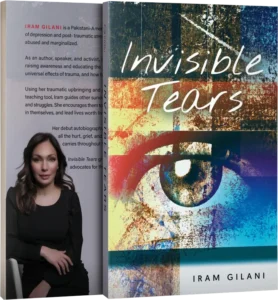In a world that often emphasizes stoicism and self-reliance, Iram Gilani offers a profoundly different perspective in her autobiography, Invisible Tears. Her story isn’t the typical American Dream narrative; it’s a deeply personal account of love, growth, and overcoming a life burdened by insecurity. Born to Pakistani-American parents, Gilani’s journey reflects her struggle against patriarchal dominance while striving toward a future of unwritten freedom.
From her earliest memories, Gilani confronts painful childhood wounds and traumatic family conflicts. Her story lays bare the harsh realities of abuse by her brother, molestation, deceit, family betrayal, mental illness, and PTSD. It also chronicles the physical disfigurement she endured, including a gunshot wound to the face, which left lasting scars both inside and out. Yet, through these challenges, her unwavering commitment to her goals shines through. Her narrative transcends personal struggle, touching on humanity’s need for healing and resilience.
Invisible Tears doesn’t just chronicle hardships; it highlights the power of compassion and love in facing fear and uncertainty. Gilani’s raw honesty about her childhood trauma, lifelong struggles, and fractured family ties resonates with readers from all walks of life. Her battle for identity, freedom, and peace amidst adversity becomes a universal tale of triumph.
Gilani’s experiences offer hope to those grappling with their own struggles. Her autobiography serves as both a personal story and a self-help guide, offering profound insights for anyone seeking to reach their potential despite life’s challenges. Beyond the book, Gilani has become a passionate advocate for the abused and marginalized. Through speaking engagements and activism, she mentors others, inspiring them to navigate their healing journeys with positivity.
Her aspirations include turning Invisible Tears into a film adaptation, aiming to broaden its impact by bringing her story to the screen. She also aspires to become a motivational speaker, reaching out to those searching for light in their darkest moments. Additionally, she aims to either partner with or establish a nonprofit organization dedicated to providing tangible support for trauma survivors.
The journey depicted in Invisible Tears is both harrowing and transformative. From experiencing abuse to navigating loss and the cultural expectations surrounding women’s roles within her community, the memoir delves into themes that are both deeply personal and universally relatable.
Gilani’s story is not just about survival; it’s about thriving against seemingly insurmountable odds. It shows how one can find community and build strength through vulnerability—a message that’s especially important in today’s world, where many feel isolated in their struggles.
“Iram Gilani is a voice for the voiceless,” notes one peer, a sentiment echoed by many who have found comfort in her words. By facing her trials with honesty and vulnerability, she inspires readers not just to endure but to grow beyond the limitations imposed by circumstances or societal norms.
Invisible Tears is more than an autobiography; it’s an invitation to embrace vulnerability as a source of strength. Gilani’s narrative offers invaluable companionship for those on a path to healing or searching for meaning in the midst of adversity.

As we consider Iram Gilani’s many roles—as an author moving past trauma toward advocacy and as a mentor guiding others through shared vulnerabilities—it becomes clear that Invisible Tears encapsulates more than just her individual experiences; it encapsulates the essence of human resilience.
You can learn more about Iram Gilani’s transformative work at www.IramGilani.com, a space dedicated to sharing her journey and fostering a community where stories like hers can inspire change and offer support for those finding their way from invisible tears to visible strength.











